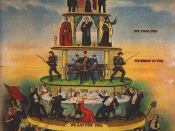Capitalism and Socialism are very different. Capitalism, for instance, is an economic system where the production of goods is regulated by the people as well as the selling of goods. People own most of the companies, not the government. Their market is reliant on supply and demand. This causes companies that are incompetent to go out of business, and efficient companies to prosper. It also offers the consumer a better quality good for the least amount of money. Socialism on the other hand, is very different. In a Socialist economy, the government owns most of the prosperous companies. The government then regulates how much of a product is produced, distributed and how much the good will cost the consumer.
Now in Free-Market Competition, the government cannot place any rules on the private owners of businesses, which is referred to laissez-faire. The consumer shall in the end decide which companies will survive and which ones will fail.
For the consumer this will produce the greatest product for the largest number of consumers, as long as there is no "red tape" caused by the government, or any other abnormal hurdle.
Private ownership allows the person to have a few extra rights. When you own your own business, you have the right to open the hors that you see fit. You may also expand your company to accommodate an increase in sales volume. Your company can also be sold if you see fit. With all of these choices, the government may not under any circumstances interfere with planning, regulations and rules.
Pursuit of profit in a society can make the best product for the largest number of persons. In a Capitalist society it can have a few positive results. Such as the best business owner will earn the most money, and the consumer...



Capitalism vs. Socialism
After reading this paper, I have to admit that I am quite impressed. The introduction gave a clear, detailed description of what capitalism is and what socialism is. The transitions were very fluent and gave the paper a positive flow. The conclusion was a great way to end it with a bang. But, the final sentence should close out the essay better. As far as the information goes, superb!!!! I give this essay an A-. Good Work.
2 out of 2 people found this comment useful.